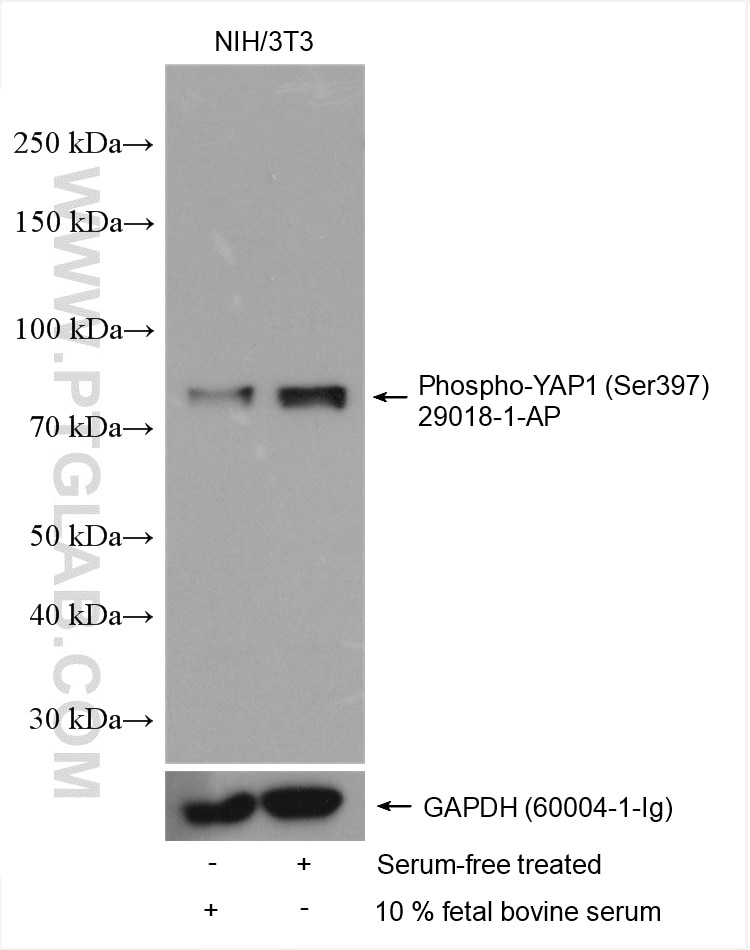Phospho-YAP1 (Ser397) Polyklonaler Antikörper
Phospho-YAP1 (Ser397) Polyklonal Antikörper für WB, ELISA
Wirt / Isotyp
Kaninchen / IgG
Getestete Reaktivität
human, Maus und mehr (1)
Anwendung
WB, IHC, IF, ELISA
Konjugation
Unkonjugiert
Kat-Nr. : 29018-1-AP
Synonyme
Geprüfte Anwendungen
| Erfolgreiche Detektion in WB | Serum-free treated NIH/3T3 cells, mit 10%igem fetalen Rinderserum behandelte NIH/3T3-Zellen |
Empfohlene Verdünnung
| Anwendung | Verdünnung |
|---|---|
| Western Blot (WB) | WB : 1:2000-1:16000 |
| It is recommended that this reagent should be titrated in each testing system to obtain optimal results. | |
| Sample-dependent, check data in validation data gallery | |
Veröffentlichte Anwendungen
| WB | See 25 publications below |
| IHC | See 2 publications below |
| IF | See 1 publications below |
Produktinformation
29018-1-AP bindet in WB, IHC, IF, ELISA Phospho-YAP1 (Ser397) und zeigt Reaktivität mit human, Maus
| Getestete Reaktivität | human, Maus |
| In Publikationen genannte Reaktivität | human, Maus, Ratte |
| Wirt / Isotyp | Kaninchen / IgG |
| Klonalität | Polyklonal |
| Typ | Antikörper |
| Immunogen | Peptid |
| Vollständiger Name | Yes-associated protein 1, 65kDa |
| Berechnetes Molekulargewicht | 504 aa, 54 kDa |
| Beobachtetes Molekulargewicht | 75 kDa |
| GenBank-Zugangsnummer | BC038235 |
| Gene symbol | YAP1 |
| Gene ID (NCBI) | 10413 |
| Konjugation | Unkonjugiert |
| Form | Liquid |
| Reinigungsmethode | Antigen-Affinitätsreinigung |
| Lagerungspuffer | PBS with 0.02% sodium azide and 50% glycerol |
| Lagerungsbedingungen | Bei -20°C lagern. Nach dem Versand ein Jahr lang stabil Aliquotieren ist bei -20oC Lagerung nicht notwendig. 20ul Größen enthalten 0,1% BSA. |
Hintergrundinformationen
The transcriptional factors Yes-associated protein 1 (YAP1) and PDZ-binding motif (TAZ) act as downstream effectors of the Hippo pathway, and their subcellular location and transcriptional activities are affected by multiple post-translational modifications (PTMs). After phosphorylation, YAP1/TAZ binds to the 14-3-3 protein, which induces cytoplasmic retention of YAP1/TAZ. Moreover, phosphorylated YAP1/TAZ is likely to undergo ubiquitination degradation that is dependent on the β-transducin repeat-containing E3 ubiquitin protein ligase complex. The phosphorylation of YAP at Ser127 promotes its cytoplasmic retention, whereas phosphorylation at Ser397 induces degradation. (PMID: 29682330, PMID: 26039999)
Protokolle
| PRODUKTSPEZIFISCHE PROTOKOLLE | |
|---|---|
| WB protocol for Phospho-YAP1 (Ser397) antibody 29018-1-AP | Protokoll herunterladen |
| STANDARD-PROTOKOLLE | |
|---|---|
| Klicken Sie hier, um unsere Standardprotokolle anzuzeigen |
Publikationen
| Species | Application | Title |
|---|---|---|
Front Immunol The role of YAP1 in survival prediction, immune modulation, and drug response: A pan-cancer perspective | ||
Int Immunopharmacol ASIC1a regulates ferroptosis in hepatic stellate cells via the Hippo/Yap-1 pathway in liver fibrosis | ||
Int Immunopharmacol Ischemia-inhibited ferric chelate reductase 1 improves ferroptosis-mediated intestinal ischemia injury via Hippo signaling | ||
Sci Rep Gingival proteomics reveals the role of TGF beta and YAP/TAZ signaling in Raine syndrome fibrosis | ||
Mol Cell Biochem RNF144A-AS1 stabilizes TAF15 and promotes malignant biological behaviors of skin cutaneous melanoma |
Rezensionen
The reviews below have been submitted by verified Proteintech customers who received an incentive for providing their feedback.
FH Udesh (Verified Customer) (08-19-2024) | Worked well to detect pYAP at 70 kDa
 |


